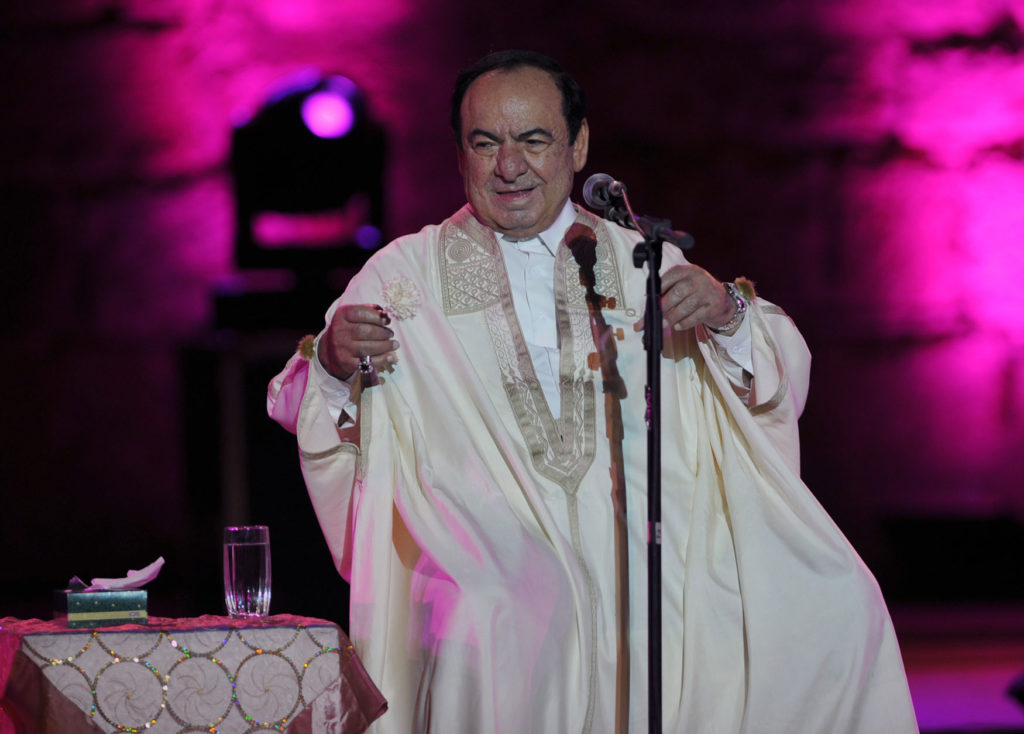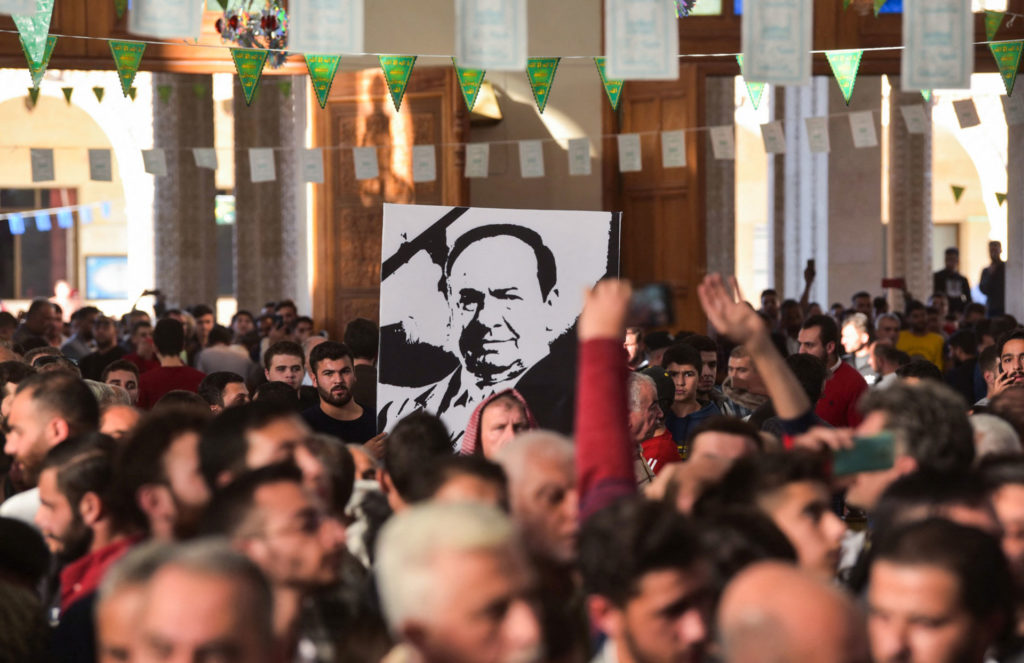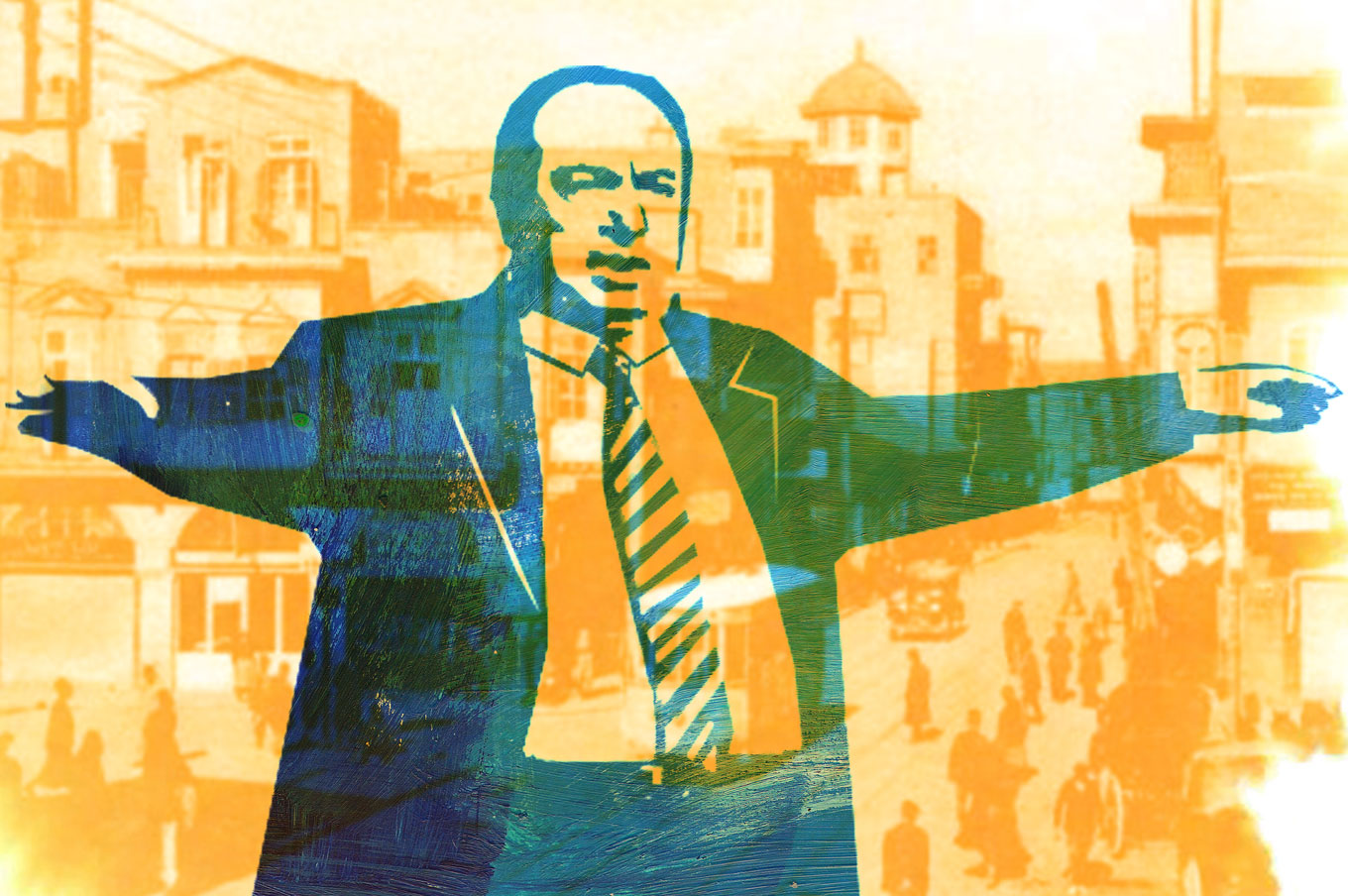Sabah Fakhri was no stranger to the corridors of power in Syria, though he generally held his opinions close to his chest.
He was first invited to the presidential palace in the Muhajireen neighborhood in Damascus in 1948, during the tenure of Syrian President Shukri al-Quwatli. His last visit to the People’s Palace atop Mount Qasioun in the Syrian capital was in July, when President Bashar al-Assad was sworn in after his reelection.
Fakhri’s reputation at the very top of Syrian society lasted an astonishing 73 years, and his reputation as a giant of classical Arabic music has been equally formidable.
He died on Tuesday, Nov. 2, at the age of 88.
Throughout these many decades, Fakhri broke a common tradition among famous singers and artists in the Middle East, never making a song that praised a politician. It was solely his talent and artistic profile that helped him gain the respect of political leaders, especially in Syria.
In his long career, the iconic singer was a witness to the seemingly endless drama and intrigue of political life in Syria, where dozens of bloodless coups unfolded, at times only months apart. Indeed, his story parallels the tumultuous political history of Syria, specifically the social upheavals that have taken place in Aleppo, his beloved metropolis, and in Damascus, where he spent most of his adult life.
Before he took on the stage name Sabah Fakhri, he was Sabah al-Din Abu Qaws, born in 1933 in Aleppo’s Old City, where he grew up surrounded by the masters of tarab — the classical and folkloric music that often connotes a state of trance associated with religious rituals — and among composers and performers of the famous Aleppine musical genre known as qudud, in which ancient poetry is sung with rhythmic, Sufi-inspired religious melodies. The word qudud originally referred to a musical circle for religious chanting.

But perhaps the most remarkable aspect of his legacy is that although his music grew organically from these religious traditions, his renditions would later move away from that while retaining the spirit of religiosity, making his art form unique to him.
Growing up, Fakhri mixed with religious vocalists and Quran reciters. His father, a Sufi cleric, used to take him to the Atrush Mosque in an adjacent neighborhood, where the religious circles of dhikr (prayers to God) and Sufi chanting were held. He had his early education in katateeb, traditional schooling that combined religious studies, reading, writing and mathematics.
In Bab al-Nairab in Aleppo, the prepubescent Fakhri performed his first religious chant, known as nasheeds, and sang his first songs in public when he was only 8 years old. He was able to learn the recitation of the Quran in the mosques of Aleppo and Sufi Naqshbandi circles.
Like most musicians of his generation, he began performing in public by reciting the Quran, and his music grew out of singing at religious events.
This interplay between religiosity and musicality is a defining aspect of Arabic music in the classical era, giving a familiarity to the cadence and tone of musical performances.
Fakhri attended the Quranic school in Aleppo and later became a muezzin, performing the calls to prayer. Many years later he called Quranic recitation “the great school for performance,” and his ability to move an audience to emotional heights while retaining clear pronunciation owes much to such recitation.
But first he had to prove his credentials to the masters of tarab, who followed the same traditions that graduated such icons as Muhammad Abdel Wahab and Umm Kulthum in Egypt. Training in tarab demanded the same rigor and fidelity as religious chanting does.
In the late 1940s, he relocated to Damascus with little more than a renewed commitment to music and a prayer rug, as he had put it to an interviewer. His goal was to continue his training in Cairo, then the nexus of the Arabic music industry. It was around that time that his friend Sami Alshawwa introduced him to the veteran politician Fakhri al-Baroudi, one of the founders of the National Bloc that had led the national resistance movement against the French Mandate in Syria, who was also a musician and poet.
Al-Baroudi immediately recognized the young singer’s talent and committed to helping him launch his career. Forget Cairo, al-Baroudi reckoned. He arranged for Fakhri to perform at the presidential palace, where Shukri al-Quwatli — a popular leader who would return to power despite three coups — was president. It was 1948, and Fakhri had already achieved some level of local fame thanks to the new local radio stations.
Indeed, this move would open up all the doors to Fakhri, for not only did he impress al-Quwatli, but all the artists and society elites started to pay attention to him. Soon thereafter Fakhri sang at the wedding of the president’s daughter, and under al-Baroudi’s aegis he was promptly offered a place at the prestigious Music Institute in the Sarouja neighborhood of Damascus.
Hence the name change from Sabah al-Din Abu Qaws to “Sabah Fakhri,” an ode of appreciation to his patron Fakhri al-Baroudi.
Fakhri may have stayed at arm’s length from politics, but he always moved in political circles. When al-Quwatli and Egypt’s Arab nationalist president Gamal Abdel Nasser visited Aleppo during the days of a short-lived Syrian-Egyptian political union in 1958, Fakhri bellowed the call to prayer in front of Nasser at the Kallaseh Mosque, which was later renamed for Nasser. In a sense, Cairo came to him. Fakhri continued to make the call to prayer from its mantle for some time after that. During this time a national television association was established in Syria, and through it Fakhri achieved even wider fame in the country and throughout the region.
Fakhri’s friends told me that he was against Baathist rule in the 1960s, especially after the 1963 coup, but his attitude toward Syria’s dominant political party changed in 1970, when Hafez al-Assad came to power.
During Hafez’s early rule, Fakhri toured many Arab capitals and met Arab leaders, often leaving his audience with an unwavering sense of awe of his musical delivery, especially his performances of Aleppine qudud, which hybridized traditional religious rituals and ancient poetry to create modern music. His concerts lasted several hours, and with the combination of traditional lyrics and melody, they could feel like a trance-inducing religious ritual. Even in his unique dancing on stage, he often mimicked the Sufi whirling dervish. Indeed, the most iconic picture of him, in which he stretches his arms, is inspired more by the dervishes’ dance than by music tradition.
Earlier, in the 1960s, he had continued to lead religious events in Aleppo and started working as an actor alongside the iconic Syrian artist Duraid Lahham. In his early acting years, he participated in a documentary film about al-Baroudi and appeared alongside the Algerian diva Wardah as the lead actor and singer in the series “Al-Wadi al-Kabir” (the Great Valley), which was filmed in Lebanon.
Fakhri expressed support for Hafez, in private, because the former president “brought fresh air, different from other leaders in the army and the ruling Baath Party,” as he would later tell his friends. During the 1990s, he devoted his time to singing and participating in government-run festivals in Syria, and he entered the People’s Assembly (the Syrian Parliament) in 1998. He also headed the Artists Syndicate, a party-affiliated government institution in Syria.
Then-Parliament Speaker Abdel Qader Qaddoura would later joke (more than once) in closed sessions: “The only voice I used to hear [at the Parliament] was the voice of Sabah Fakhri.” The statement equally lampooned Syria’s ineffective national legislature while noting Fakhri’s larger-than-life presence.
I spoke to Fakhri before his death. He, more than any other celebrity living in Damascus during the previous years, continued to privately express support for the Assads (both Hafez and Bashar). Indeed, he received the Medal of Merit in 2007 under the patronage of Bashar “in appreciation of his art and effort in preserving authentic Arab art and for raising the banner of the continuity of the original Arab artistic heritage,” as stated in the honoring brochure. The presidential palace provided Fakhri with support and pomp, placing official cars at his disposal and, on one occasion, even a private jet to take him from Damascus to Aleppo.
Like most of the country’s artists, especially those of his stature, Fakhri was expected to take a side during the upheavals that swept the region. Although he was against the anti-government protests that began in 2011 and approved of the government response to them, he made no public statements, unlike many of his peers. His silence invited criticism, but it also removed him from the political sphere and kept his music front and center.

Fakhri was the last of the generation that produced giants like the late Umm Kulthum and Muhammad Abdel Wahab, and remains widely credited with preserving the traditional Arab musical heritage, especially the uniquely Aleppine traditions.
Although his career was dominated by secular music, Fakhri kept in touch with his religious musical roots and early influences. He was the lead performer in the recitation of God’s 99 names on Syrian television, a spiritual show typically broadcast during the fasting month of Ramadan throughout the 1990s. He set a world record by singing on stage for more than 10 continuous hours without a break during an unforgettable concert held in 1968 in Venezuela. According to his family, he was fussy about protecting his voice, opting to wear a scarf around his neck to protect against a draft and making a point to eat honey with traditional herbs to help soothe his vocal cords.
Even in his last years, Fakhri’s music evoked different times and left his listeners feeling nostalgic for a past long gone. By the time he died, much had changed in Syria and throughout the region.
He was deeply saddened by the destruction that had befallen the Citadel of Aleppo in recent years, privately mourning the loss of the amphitheater and the old market of Aleppo that launched his career, for Aleppo remained a jewel in his heart until his dying breath. It had been his wish to give up the ghost on the steps of the Citadel or in Old Aleppo, a private thought that he had confided to his loved ones. But alas, it was not to be.
Perhaps particularly heartbreaking to him and to his fans was that religious fanatics in Aleppo during the early years of the uprising and war marked Fakhri’s most iconic songs as “blasphemous.”
One of these songs was a poem composed by the seventh-century Iraqi Sufi poet Rabiya bin Amer, better known as Miskeen al-Darimi. In it, Fakhri sings:
Ask the beauty in the black shroud, what have you done to a pious man?
He had rolled up his sleeves getting ready for prayers, until he saw you standing by the mosque’s door
You snatched away his faith and conviction, and left him a skeptic with no guidance
Restore to him his prayers and fasting. Don’t doom him, for the sake of Muhammad and his religion
History books claim the words originated as a marketing strategy: A trader from Baghdad, who sold only black shrouds, had the poet recite the lines to boost his sales. When the word spread that a smitten pious man had forsaken his religion and resigned to sell black shrouds, women flocked to buy from him.
When Fakhri performed the song on stage, he sometimes included a part in which he reverted to his role as a muezzin. He would bellow a call to prayer while in the middle of a musical concert because the original lyrics include the same word, namely, “God is great.” It is this interweaving of religion and music — a telltale sign of Sufi influence — that can offend the most religiously puritanical, though audiences all over the region loved it and Fakhri never endured a backlash before the extremists surfaced in the early 2010s.
In another song, Fakhri delivers a line that further teeters on the cusp of religious offense, though again, for decades, his conservative audiences loved it. In this one, Fakhri invokes more Sufi imagery when he serenades his audience with these words:
“A wine drinker can sober up after the drink, but a taster of love will forever be intoxicated.”
It was a line that recalled some of the most provocative poetry of the Umayyad and Abbasid eras, a line that even Fakhri himself would have thought twice before singing it today.
If Fakhri had concerned himself with this “end of an era” feel that had befallen our region, he never expressed it publicly, preferring perhaps to let his music speak on his behalf.



